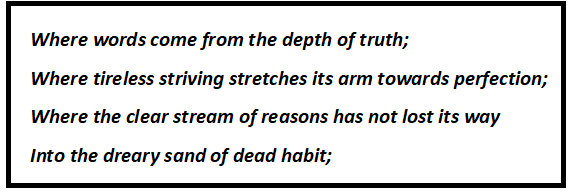Hi Everyone!! This article will share Where The Mind is Without Fear Questions & Answers.
In my previous posts, I have shared the questions and answers of Song of the Open Road, A Clump of Lilac and My Wheelchair Had Wings so, you can check these posts as well.
Where The Mind is Without Fear Questions & Answers
The poem is written by Rabindranath Tagore and it is about how the poet wants his country to be. He has certain dreams like education should be free to all, no caste and creed, communal harmony. It is a prayer to God written by renowned poet, story writer and educator Rabindranath Tagore.
Question 1: Read the lines and answer the questions:

(a) What do the expression ‘mind is without fear’ and ‘head is held high’ mean?
Answer: The poet says that no countrymen of his should live in fear on his mind at all times. Instead, they should hold their head up fearlessly and have confidence in themselves.
(b) When knowledge is not free, what will be the impact?
Answer: When knowledge is not free people who are poor will not get the right education and will become a thief or a labourer and will decrease human capital and economy of India.
(c) What breaks the world into fragments?
Answer: The world is broken into fragments by the narrow domestic walls like caste system, social classes, religion, color, creed and so on.
Question 2: Read the lines and answer the questions:

(a) What does the line’ Where words come out from the depth of truth mean?
Answer: The poet wants his countrymen to be truthful and sincere. They should not tell lies or be hypocrites. They should speak what they feel and should be guided by clear thinking in any matter.
(b) Why has the poet used the word ‘tireless’ to describe ‘striving’?
Answer: The poet has used the phrase tireless striving to urge his countrymen to break free from sloth and struggle hard constantly to achieve perfection in whatever they choose to do to make their country a free nation.
(c) What comparison did the poet give between the poet and dead habit?
Answer: The poet has compared reason to a clear stream and dead habit to a dry desert.
Where The Mind is Without Fear Questions & Answers
Question 3: Read the lines and answer the questions:

(a) Whom does the poet address as ‘thee’ and ‘my father’?
Answer: The poet is addressing to God as thee or my Father.
(b) According to the poet, what must be done for achieving ‘ever -widening thought and action?
Answer: Ever-widening thought and action means we should not be narrow or shallow in our mentality. We should have a broad heart. And a broad mind. They should enrich their thinking day by day.
(c) Describe the poet’s version of ‘heaven of freedom’?
Answer: By ‘heaven of freedom’ the poet means India’s social, cultural and psychological independence and unity.
Question 4: According to the poet, how should knowledge be?
Answer: According to the poet, knowledge should be free which means every person has knowledge about worldly matters. He says that if people living in the country possess knowledge then only it can develop. Knowledge keeps people united not dividing them on the basis of caste and creed.
Question 5: Bring out the significance of the title of the poem.
Answer: ‘Where the mind is without fear’ the title of Tagore’s poem is merely the first line of the poem. It refers to a place where people would be fearless, heaven of freedom that the poets dream of. Tagore prays to God to lift his country to such a place where people would not only be fearless but also knowledgeable, hardworking and truthful etc. And probably fearlessness was the first condition that came to Tagore’s mind while writing about his heaven of freedom. So, the title is apt and relevant as it very well expresses what the poet wishes for.
Question 6: According to the poet, what is ‘dead habit’?
Answer: According to him, dead habit means a country which has not lost the right path in the dreary desert of old traditional rituals and customs that are harmful for the country and the society.
Question 7: What kind of ‘domestic wall’ is the poet speaking about?
Answer: The poet is talking about the barriers of class, caste, creed, colour, religion and other elements that divide people from one another. In most cases, those are baseless superstitious beliefs and good for nothing.
So, these were Where The Mind is Without Fear Questions & Answers.